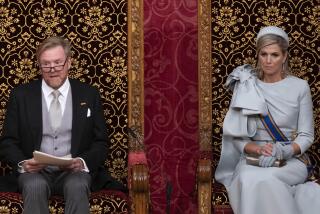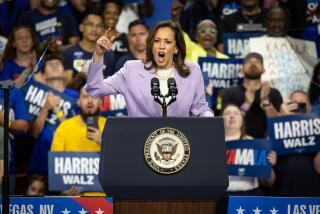S. Africa Party’s Apartheid Plan Calls for Slow Reform
- Share via
JOHANNESBURG, South Africa — The ruling white National Party’s five-year plan of “new action” for apartheid reform, a platform for its expected victory in September’s elections and a blueprint for the country’s future, makes it clear that South Africa’s rulers have chosen slow, steady change rather than a quick overhaul, political analysts say.
The plan, approved at a party congress last week, has disappointed many liberal whites who had hoped the probable president, Frederik W. de Klerk, would take even more drastic steps to greatly speed up the pace of reform, which had stalled under outgoing President Pieter W. Botha.
“It will not satisfy liberal-minded whites in this country, nor will it satisfy overseas critics of the government,” Willie Kleynhans, a professor of political science at the University of South Africa in Pretoria, said Tuesday. “It’s old hat. I cannot see De Klerk being more successful than Botha was in his reform plans.”
Fending Off Challenges
The National Party platform appears to be more a reflection of practical politics than moral vision, analysts say, because its platitudes are designed to fend off election challenges from both sides of the political spectrum.
Holding the middle ground in white politics has become increasingly difficult in the past year as the gulf has widened between the right-wing white Conservative Party, which advocates stricter racial segregation, and the newly formed liberal Democratic Party, which advocates universal suffrage, a move that almost certainly would bring about black rule.
Government officials contend that the plan proves that the ruling party is committed to dismantling apartheid and negotiating with leaders of all races to build a “broad consensus” for the future. De Klerk describes it as the ticket to “a new, strong and just South Africa that offers hope and progress to everyone.”
Modify, Not Dismantle
But Anglican Archbishop Desmond M. Tutu, the 1984 Nobel Peace Prize winner, says the National Party is trying to modify apartheid rather than dismantle it.
“We don’t want apartheid made more comfortable,” he told reporters while on a trip to Europe. “We want political power. We are not interested in reform. We want to see apartheid abolished.”
The party platform promises democracy, a dynamic economy, safety and harmony for all of South Africa’s citizens. But it also guarantees the protection of so-called group rights, for 40 years the girders of apartheid. And the plan reiterates the party’s commitment to the Group Areas Act, which provides for segregated housing, although it promises to “more sensitively enforce” it.
Part of the new method of enforcement involves setting up government centers where people can report suspected violators of the Group Areas Act to housing officials, who will try to resolve the problem without calling in the police.
Conservatives’ Fears
The opposition Conservative Party has sharply criticized the National Party for refusing to enforce the Group Areas Act; many conservative whites fear their neighborhoods will be overrun by blacks, who face a severe housing shortage.
South African Democratic Party politicians this week said the centers would be “Gestapo bureaus,” vicious instruments of apartheid designed to turn neighbor against neighbor.
But in an attempt to appeal to the verligte , or “enlightened,” liberal wing of the National Party, the party leaders have formally supported the creation of yet another “group”--one made up of people who don’t want to belong to any racially designated group.
Parliament passed legislation this year that will establish open residential areas for the first time, and the residents of those areas would be the likeliest candidates for the new non-racial group. But many issues remain to be decided, among them whether schools and hospitals in open areas would also be open and whether people joining the open group would be allowed to vote in national elections.
Election rolls currently are divided by race. Whites, mixed-race Colored and Indians vote separately, electing segregated houses of Parliament. South Africa’s 26 million blacks, who outnumber whites about 5 to 1, currently have no vote in Parliament and will not be allowed to cast ballots in the Sept. 6 general elections.
The National Party says it intends to bring blacks into the political decision-making process in the country--but it also protects whites and other minorities from “domination” by the black majority.
A National Party victory in the elections is considered a foregone conclusion. But if the Conservative and Democratic parties make significant inroads in Nationalist support, the government could be forced to alter its plan for the future.
Liberal whites and black anti-apartheid groups have repeatedly said that meaningful reform in South Africa cannot begin until the government releases Nelson R. Mandela, the jailed black nationalist leader, lifts a thee-year-old state of emergency that has curtailed civil rights and agrees to sit down and talk with recognized black leaders.
More to Read
Sign up for Essential California
The most important California stories and recommendations in your inbox every morning.
You may occasionally receive promotional content from the Los Angeles Times.














